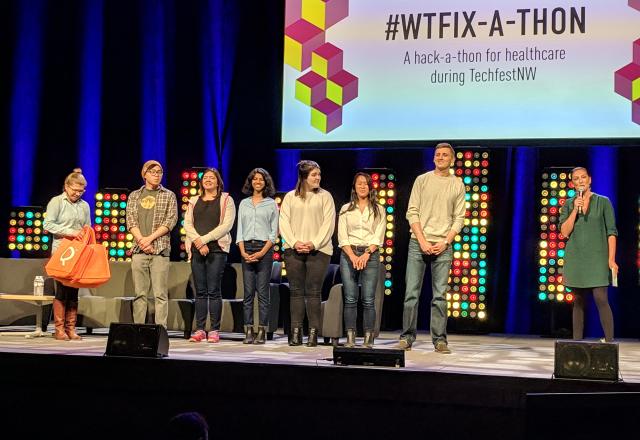
Helping people with compromised immune systems navigate a world that is partially unvaccinated can be a daunting task. Having price transparency in health care may seem impossible. Removing barriers to health care access, such as transportation from the patient’s home to the doctor’s office, can seem too good to be true. Yet for the programmers and coding students that participated in a recent human-centered design health hackathon, it was their opportunity to turn problems into real applications.
This Spring, students from various coding schools were invited to tackle these important health care issues and solve them in a hackathon style event, where a short number of hours or days are allotted for programming teams to come up with technology-based solutions that are then pitched to an expert panel of judges who vote on a winning application.
HealthSparq, a Cambia company, hosted the first ever health hackathon at TechFestNW, an annual technology conference. The hackathon was dubbed #WTFIX-A-THON, a nod to the social movement – “What’s the Fix?” – to help make health care better. “Our aim was, and still is, to have regular people with amazing stories teach the health care industry; while also inspiring people to take health care into their own hands and make a positive change,” said Anna Greene, the digital marketing manager for HealthSparq.
Cultivating Health Care Solutions Overnight
In just 36 hours, the winning team built an application that would help patients without accessible or reliable transportation get “from point A to point B” by creating more “user friendly options.” This app would help patients get from anywhere to their medical appointments on time.
“I’m a primary caregiver for my mom and she has a lot of chronic conditions and needs my help a lot. It felt good to create an app that empowers her to take control over her health and not feel like she always has to go through me.” – Hackathon Participant
“The health care future is bright if these are the students and the people that are going to be involved” in the future of health care solutions, said Mark Vo, VP of engineering at HealthSparq. “It was just a fresh perspective - that was very exciting to see,” he concluded.
Heather Burton, Director of Marketing at HealthSparq, was excited to see how the hackathon inspired the students to think about ways to make health care better and “free it from the status quo.”